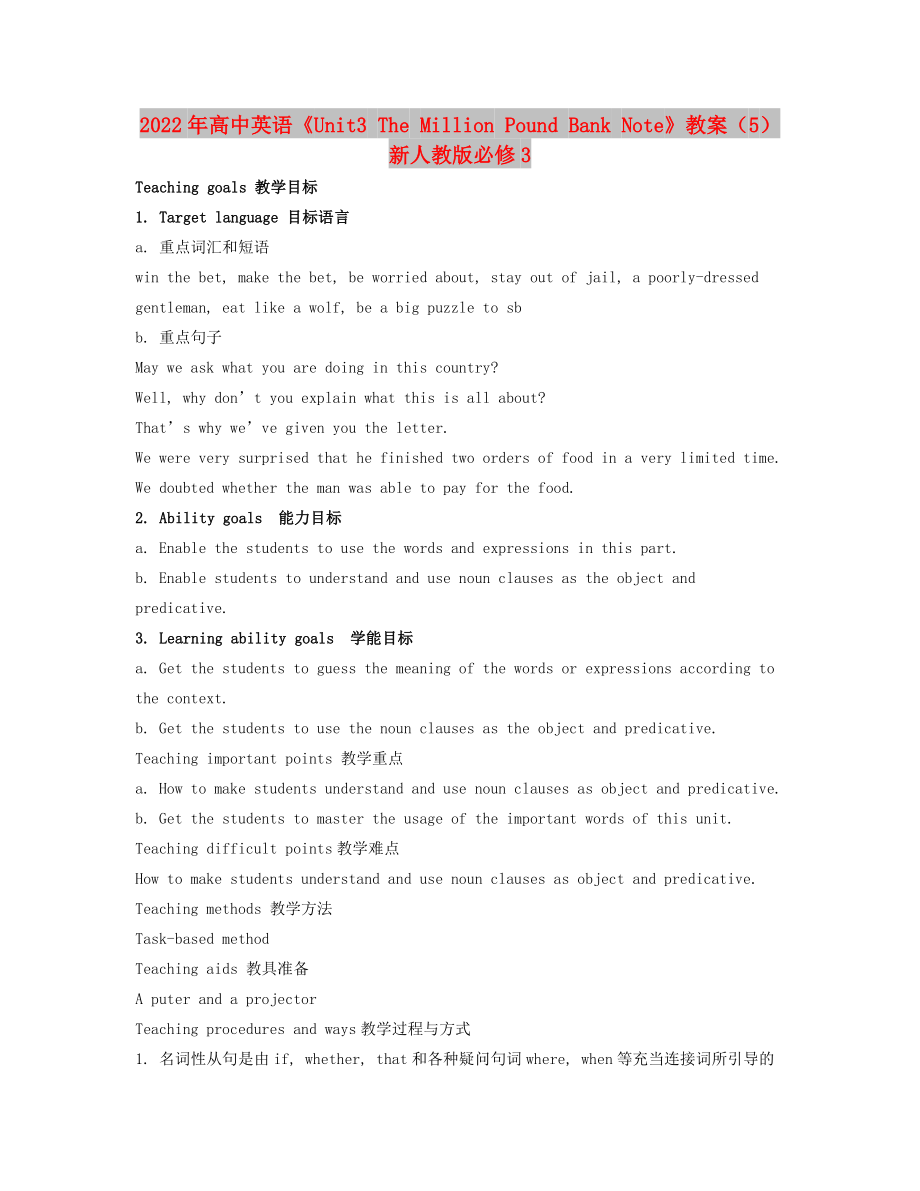《2022年高中英語《Unit3 The Million Pound Bank Note》教案(5)新人教版必修3》由會(huì)員分享��,可在線閱讀�����,更多相關(guān)《2022年高中英語《Unit3 The Million Pound Bank Note》教案(5)新人教版必修3(2頁珍藏版)》請(qǐng)?jiān)谘b配圖網(wǎng)上搜索����。
1、2022年高中英語《Unit3 The Million Pound Bank Note》教案(5)新人教版必修3
Teaching goals 教學(xué)目標(biāo)
1. Target language 目標(biāo)語言
a. 重點(diǎn)詞匯和短語
win the bet, make the bet, be worried about, stay out of jail, a poorly-dressed gentleman, eat like a wolf, be a big puzzle to sb
b. 重點(diǎn)句子
May we ask what you are doing in this countr
2�����、y?
Well, why don’t you explain what this is all about?
That’s why we’ve given you the letter.
We were very surprised that he finished two orders of food in a very limited time.
We doubted whether the man was able to pay for the food.
2. Ability goals 能力目標(biāo)
a. Enable the students to use the wor
3、ds and expressions in this part.
b. Enable students to understand and use noun clauses as the object and predicative.
3. Learning ability goals 學(xué)能目標(biāo)
a. Get the students to guess the meaning of the words or expressions according to the context.
b. Get the students to use the noun clauses as th
4����、e object and predicative.
Teaching important points 教學(xué)重點(diǎn)
a. How to make students understand and use noun clauses as object and predicative.
b. Get the students to master the usage of the important words of this unit.
Teaching difficult points教學(xué)難點(diǎn)
How to make students understand and use noun cla
5����、uses as object and predicative.
Teaching methods 教學(xué)方法
Task-based method
Teaching aids 教具準(zhǔn)備
A puter and a projector
Teaching procedures and ways教學(xué)過程與方式
1. 名詞性從句是由if, whether, that和各種疑問句詞where, when等充當(dāng)連接詞所引導(dǎo)的從句, 其功能同名詞一樣。
2. what與that在引導(dǎo)名詞性從句時(shí)的區(qū)別:
what引導(dǎo)名詞性從句時(shí)在從句中充當(dāng)句子成分,如主語,賓語,表語,而that則不
6����、然,它在句子中只起連接作用。例如:
(1) What you said yesterday is right.
(2) That she is still alive is a puzzle.
3. 賓語從句就是在復(fù)合句中作賓語的名詞性從句, 通常放在主句謂語動(dòng)詞(及物動(dòng)詞)或介詞之后���。
(1) 由that 引導(dǎo)的賓語從句(that通??梢允÷?, 例如:
I heard that he joined the army.
(2) 由what, whether (if)引導(dǎo)的賓語從句,例如:
① She did not know what had happened.
②
7�、 I wonder whether you can change this note for me.
4. 否定的轉(zhuǎn)移:若主語謂語動(dòng)詞為think, consider, suppose, believe, expect, guess, imagine等,其后的賓語從句若含有否定意義,一般要把否定詞轉(zhuǎn)移到主句謂語上,從句謂語用肯定式。
I don’t think this dress fits you well. (我認(rèn)為這件衣服不適合你穿�����。)
5. it?����?梢苑旁趧?dòng)詞think, find, consider, believe, feel, make等后作為形式賓語:it不僅可以作為
8、形式主語���,還可以作為形式賓語而真正的賓語-that從句則放在句尾,特別是在帶復(fù)合賓語的句子中��。 We heard it that she would get married next month.
6. 表語從句是在復(fù)合句中作表語的名詞性從句, 放在系動(dòng)詞之后,一般結(jié)構(gòu)是“主語+系動(dòng)詞+表語從句”�?��?梢越颖碚Z從句的系動(dòng)詞有be, look, remain, seem等���。引導(dǎo)表語從句的that常可省略����。另外,常用的還有the reason why … is that … 和It is because …等結(jié)構(gòu)。例如:
1). The question is whether we can make good preparation in such a short time.
2). This is why we can’t get the support of the people.
3). But the fact remains that we are behind the other classes.
4). The reason he is late for school is that he missed the bus.
 2022年高中英語《Unit3 The Million Pound Bank Note》教案(5)新人教版必修3
2022年高中英語《Unit3 The Million Pound Bank Note》教案(5)新人教版必修3

